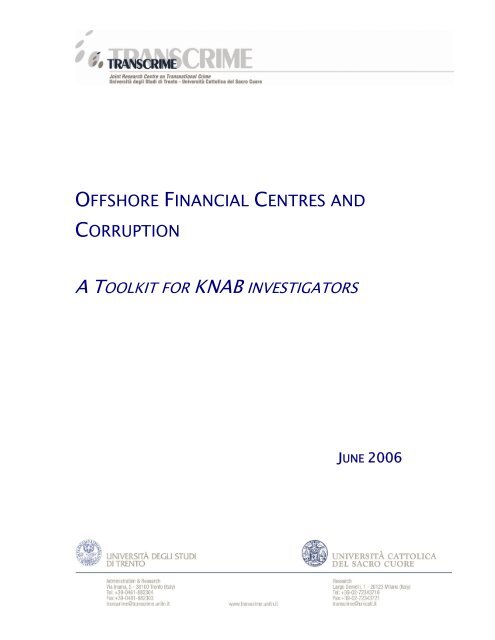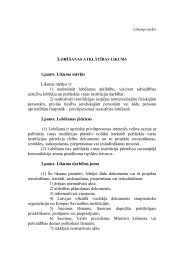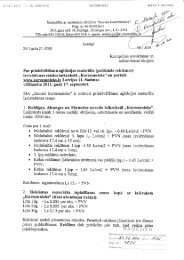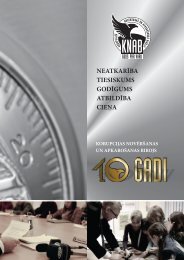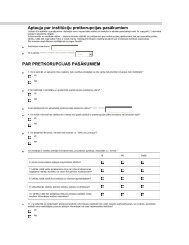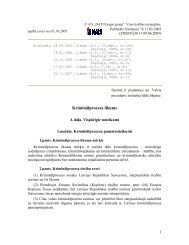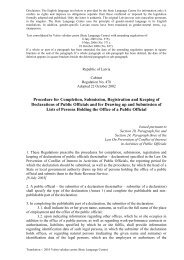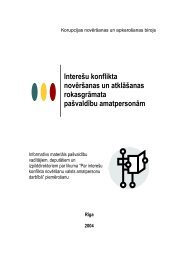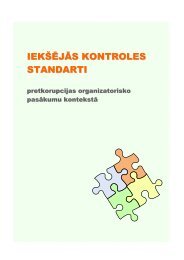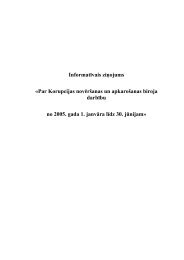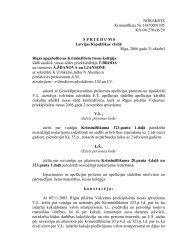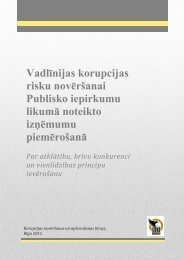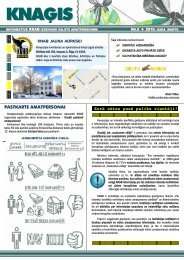OFFSHORE FINANCIAL CENTRES AND CORRUPTION - KNAB
OFFSHORE FINANCIAL CENTRES AND CORRUPTION - KNAB
OFFSHORE FINANCIAL CENTRES AND CORRUPTION - KNAB
You also want an ePaper? Increase the reach of your titles
YUMPU automatically turns print PDFs into web optimized ePapers that Google loves.
<strong>OFFSHORE</strong> <strong>FINANCIAL</strong> <strong>CENTRES</strong> <strong>AND</strong><br />
<strong>CORRUPTION</strong><br />
A TOOLKIT FOR <strong>KNAB</strong> INVESTIGATORS<br />
JUNE 2006
- Offshore Financial Centres and Corruption: a Toolkit for <strong>KNAB</strong> investigators -<br />
TABLE OF CONTENTS<br />
1. INTRODUCTION .........................................................................................................2<br />
2. <strong>OFFSHORE</strong> PROBLEMS.................................................................................................3<br />
2.1. WHAT ARE <strong>OFFSHORE</strong> <strong>CENTRES</strong> (LEGAL CHARACTERISTICS) <strong>AND</strong> WHY DO CRIMINALS GO <strong>OFFSHORE</strong>?........ 3<br />
2.1.1. Offshore finance users..................................................................................... 5<br />
2.1.2. Legitimate and illegitimate offshore purposes .................................................. 5<br />
2.1.3. Why criminals go offshore ............................................................................... 7<br />
2.1.4. Proponents and critics ..................................................................................... 8<br />
2.1.5. List of offshore financial centres ...................................................................... 9<br />
2.2. MOST IN DEM<strong>AND</strong> TYPES OF <strong>OFFSHORE</strong> COMPANIES................................................................... 9<br />
2.2.1. Desirable corporate characteristics................................................................... 9<br />
2.2.2. Offshore LLC as an asset protection tool ........................................................ 10<br />
2.3. OFCS <strong>AND</strong> THE INTERNET (ICT) ....................................................................................... 11<br />
2.4. OFCS <strong>AND</strong> <strong>CORRUPTION</strong>................................................................................................. 12<br />
3. INVESTIGATING OFCs ............................................................................................... 14<br />
3.1. <strong>OFFSHORE</strong> INVESTIGATIONS IN ACTION: EXAMPLES OF INVESTIGATIVE CASES ................................... 14<br />
3.1. BARRIERS TO INVESTIGATING OFCS.................................................................................... 16<br />
3.2. MAIN PRECONDITIONS FOR EFFECTIVE INVESTIGATION.............................................................. 17<br />
3.3. TIPS FOR <strong>OFFSHORE</strong> <strong>FINANCIAL</strong> INVESTIGATIONS .................................................................... 18<br />
3.3.1. Introduction .................................................................................................. 19<br />
3.3.2. Initial information/case initiation: the notitia criminis..................................... 20<br />
3.3.2. Collecting evidence during the investigative activities ..................................... 20<br />
4. RECCOMMENDATIONS TO LATVIAN AUTHORITIES....................................................... 24<br />
BIBLIOGRAPHY............................................................................................................. 26<br />
1
1. INTRODUCTION<br />
- Offshore Financial Centres and Corruption: a Toolkit for <strong>KNAB</strong> investigators -<br />
This report has been drafted by Transcrime, Università degli Studi di Trento/Università<br />
Cattolica di Milano (Italy), for <strong>KNAB</strong>, in the same field as the project Raising the Institutional<br />
and professional capacity of the Corruption Prevention and Combating Bureau (<strong>KNAB</strong>), Latvia,<br />
carried out by Rambøll Management. 1<br />
This report is a “practical toolkit” for Latvian investigators in the field of offshore centres,<br />
money laundering and corruption. It gives some basic information in order to answer the<br />
following questions: what are offshore centres and why do criminals operate offshore? What<br />
are the legal characteristics which make offshore financial companies attractive to<br />
consumers but also for criminals? Is there a link between offshore centres and the Internet?<br />
Is there a link between offshore centres and corruption? What can we learn from cases<br />
already investigated across the world? Is it possible to devise some tips or best practices that<br />
can help to more effectively conduct an offshore financial investigation?<br />
We are extremely grateful to the Italian Guardia di Finanza, the Italian financial police, for<br />
providing us with support with reference to the section on offshore investigations. We would<br />
also like to take this opportunity to thank Col. (Colonel) Giorgio Viola, Head of the<br />
Operational Office of the Comando regionale of the Guardia di Finanza (Trentino-Alto<br />
Adige), and Ten. Col. (Lieutenant Colonel) Stefano Murari, Commander of the Comando<br />
Provinciale of the Guardia di Finanza of Trento, and for their extreme competence and<br />
invaluable help.<br />
In this report the terms offshore financial centre/centres have been abbreviated to<br />
OFC/OFCs.<br />
1 The authors of this report are Andrea Di Nicola, researcher in criminology at the Faculty of Law of the Università di<br />
Trento and research coordinator of Transcrime (Trento office), Pier Nicolò Cecchin, Manuel Foradori, Viorelia Gasca,<br />
Gloria Pesarin, Valentina Tenti, Marco Zanella, all interns at Transcrime. The drafting of the report was coordinated<br />
and edited by Andrea Di Nicola.<br />
2
2. <strong>OFFSHORE</strong> PROBLEMS<br />
- Offshore Financial Centres and Corruption: a Toolkit for <strong>KNAB</strong> investigators -<br />
2.1. WHAT ARE <strong>OFFSHORE</strong> <strong>CENTRES</strong> (LEGAL CHARACTERISTICS) <strong>AND</strong> WHY DO CRIMINALS GO <strong>OFFSHORE</strong>?<br />
Although ‘offshore’ does not automatically denote illegal or criminal activity, numerous<br />
international organisations (UN, FATF, OECD, Council of Europe and the European Union) and<br />
national governments have pointed out the risk that facilities provided by financial centres<br />
and offshore jurisdictions may be exploited by organised crime groups. The offshore<br />
problem, is indeed an important item on their political agendas.<br />
“An offshore center is a country which offers to the residents of other countries the ability to<br />
establish companies and to use its financial services for activities outside this center,<br />
offering in most of the cases some advantages such as low taxation rates. In other words the<br />
aim of the users of the offshore centres is to take advantage of the lower tax rates offered by<br />
the offshores centre which is not synonymous to tax evasion as is the general perception.<br />
[...] Certain jurisdictions establish themselves as offshore financial centres in order to attract<br />
funds, provide jobs and facilitate economic development” (ROSSIDOU-PAPAKYRIACOU,<br />
1999).<br />
BOX 1. OTHER DEFINITIONS OF <strong>OFFSHORE</strong> <strong>CENTRES</strong><br />
“Offshore centres or international service centres are countries, cities or jurisdiction<br />
that provide financial, legal and other services to foreign or non–residents” (ALBA,<br />
2003)<br />
“As terms the words offshore business and offshore company have no precise legal, tax<br />
or general business meaning, as the word offshore often means nothing more than<br />
anywhere other than the place of physical location of the person using the word (i.e.<br />
overseas). We use the words offshore business and offshore company as terms of<br />
definition in connection with matters such as the structuring of international business<br />
and family wealth management or tax planning”. There are “many reasons and benefits<br />
attached to utilising international corporate or fiduciary trust structures” (OCRA<br />
WORLDWIDE, 2006).<br />
“Amongst the many definitions of Offshore Financial Centers (OFCs), perhaps the most<br />
practical characterizes OFCs as centers where the bulk of financial sector transactions<br />
on both sides of the balance sheet are with individuals or companies that are not<br />
residents of OFCs, where the transactions are initiated elsewhere, and where the<br />
majority of the institutions involved are controlled by non-residents” (INTERNATIONAL<br />
MONETARY FUND, 2000).<br />
FATF has adopted twenty-five criteria to identify non-cooperative countries and<br />
territories. Non-cooperative countries and territories in the fight against money<br />
laundering are those who have detrimental rules and practices which impair the<br />
effectiveness of their money laundering prevention and detection systems. These<br />
detrimental rules and practices refer to loopholes in financial regulations (e.g.<br />
inadequate customer identification, inadequate rules on financial intermediaries),<br />
obstacles raised by regulatory requirements (e.g., inadequate or no requirement for the<br />
registration of business and legal entities and the identification of their beneficial<br />
owners), obstacles to international co-operation at both the administrative and the<br />
judicial levels (e.g., existence of laws or practices prohibiting the international<br />
3
- Offshore Financial Centres and Corruption: a Toolkit for <strong>KNAB</strong> investigators -<br />
exchange of information), and inadequate resources for the prevention and detection<br />
of money laundering (FATF, 2000).<br />
BOX 2. PRINCIPAL ELEMENTS OF <strong>OFFSHORE</strong> <strong>FINANCIAL</strong> <strong>CENTRES</strong><br />
The country has a relatively large number of financial institutions engaged primarily in<br />
business with non-residents;<br />
Low or no taxes on business or investment income;<br />
No withholding taxes;<br />
Light and flexible incorporation and licensing regimes;<br />
Light and flexible supervisory regimes;<br />
Flexible use of trusts and other special corporate vehicles;<br />
No need for financial institutions and/or corporate structures to have a physical<br />
presence;<br />
An inappropriately high level of client confidentiality based on impenetrable secrecy<br />
laws;<br />
Unavailability of similar opportunities to residents;<br />
Protection against frivolous lawsuits;<br />
Increase of investment diversification;<br />
Moderate or light financial regulation;<br />
High rate of banking secrecy and anonymity.<br />
Since OFCs generally attract non-resident clients, the volume of non-resident business<br />
substantially exceeds the volume of domestic business. For most OFCs, funds that are on the<br />
books of the OFC are invested in the major international money-centre markets<br />
(INTERNATIONAL MONETARY FUND, 2000; <strong>FINANCIAL</strong> STABILITY FORUM, 2000).<br />
BOX 3. AN ITALIAN EXAMPLE: THE BLACK-LIST OF COUNTRIES WITH A “PRIVLEDGED FISCAL REGIME”<br />
According to the Italian Ministry of Finance Decree of 9 May 1999, the Italian government<br />
considers the following states to be employing a “privileged fiscal regime”. This means that<br />
Italian citizens resident in one of these countries, unless otherwise proven, have to pay taxes<br />
not only to the resident country, but also to the Italian state according to its legislation.<br />
Alderney (Aurigny), Andorra (Principat d'andorra), Anguilla, Antigua e Barbuda (Antigua and Barbuda), Antille<br />
olandesi (Nederlandse Antillen), Aruba, Bahama (Bahamas), Bahrein (Dawlat Al-bahrain), Barbados, Belize, Bermuda,<br />
Brunei (Negara Brunei Darussalam), Cipro (Kypros), Costa Rica (Republica de Costa Rica), Domenica, Emirati Arabi<br />
Uniti (Al-imarat Al-'arabiya al Muttahida), Ecuador (Repuplica del Ecuador), Filippine (Pilipinas), Gibilterra (Dominion<br />
of Gibraltar), Gibuti (Djibouti), Grenada, Guernsey (Bailiwick of Guernsey), Monserrat, Nauru (Republic of Nauru),<br />
Niue, Hong kong (Xianggang), Isola di man (Isle of Man), Isole Cayman (The Cayman Islands), Isole Cook, Isole<br />
Marshall (Republic of the Marshall Islands), Isole Vergini Britanniche (British Virgin Islands), Jersey, Libano (Al-<br />
jumhuriya Al Lubnaniya), Liberia (Republic of Liberia), Liechtenstein (Furstentum Liechtenstein), Macao (Macau),<br />
Malaysia (Persekutuan tanah malaysia), Maldive (Divehi), Malta (Republic of Malta), Maurizio (Republic of Mauritius),<br />
Oman (Saltanat 'Oman), Panama (Republica de Panama'), Polinesia francese (Polynesie Francaise), Monaco<br />
(Principaute' de Monaco), San marino (Repubblica di San Marino), Sark (Sercq), Seicelle (Republic of Seychelles),<br />
Singapore (Republic of Singapore), Saint Kitts e Nevis (Federation of Saint Kitts and Nevis), Saint Lucia, Saint Vincent<br />
e Grenadine (Saint Vincent and the Grenadines), Svizzera (Confederazione Svizzera), Taiwan (Chunghua Minkuo),<br />
4
- Offshore Financial Centres and Corruption: a Toolkit for <strong>KNAB</strong> investigators -<br />
Tonga (Puleanga Tonga), Turks e Caicos (The Turks and Caicos Islands), Tuvalu (The Tuvalu Islands), Uruguay<br />
(Republica Oriental del Uruguay), Vanuatu (Republic of Vanuatu), Samoa (Indipendent State of Samoa).<br />
2.1.1. Offshore finance users<br />
Potential users of offshore finance are:<br />
International companies;<br />
Individuals;<br />
Investors (individuals, investment funds, trusts etc.);<br />
Financial institutions with an affiliate in the OFC;<br />
Criminals and others.<br />
2.1.2. Legitimate and illegitimate offshore purposes<br />
Moving offshore or using an OFC does not necessarily mean committing a crime. The use of<br />
offshore services can be legitimate or illegitimate.<br />
Legitimate purposes include:<br />
To minimise tax, where this is allowed;<br />
To reduce company risks, through the use of asset holding vehicles. Many corporate<br />
conglomerates employ a large number of holding companies, and often high-risk<br />
assets are parked in separate companies to prevent legal risk accruing to the main<br />
group;<br />
To achieve better asset protection. Wealthy individuals who live in politically unstable<br />
countries utilise offshore companies to hold family wealth to avoid potential<br />
expropriation or exchange control restrictions in the country in which they live;<br />
To engage in risky investments, through the use of derivatives trading. Wealthy<br />
individuals often form offshore vehicles to engage in risky investments, such as<br />
derivatives trading, which is extremely difficult to engage in directly due to<br />
cumbersome financial market regulation;<br />
To avoid the repatriation of funds if this means a risk, through the use of exchange<br />
control trading vehicles. In countries where there is either exchange control or if there<br />
is a perceived increase in the political risk of a repatriation of funds, major exporters<br />
often form trading vehicles in offshore companies so that the sales form exports can<br />
be "parked" in the offshore vehicle until necessary for further investment;<br />
To set up joint venture vehicles in a neutral jurisdiction or a jurisdiction with more<br />
sophisticated corporate and commercial laws. Offshore jurisdictions are frequently<br />
used to set up joint venture companies, either as a compromise neutral jurisdiction<br />
and/or because the jurisdiction where joint venture has its commercial centre has<br />
insufficiently sophisticated corporate and commercial laws;<br />
To invest money through mutual funds. A mutual fund is simply a financial<br />
intermediary that allows a group of investors to pool their money together with a<br />
predetermined investment objective. The mutual fund will have a fund manager who is<br />
responsible for investing the pooled money into specific securities (usually stocks or<br />
bonds);<br />
5
- Offshore Financial Centres and Corruption: a Toolkit for <strong>KNAB</strong> investigators -<br />
To obtain a stock market listing vehicle. Successful companies who are unable to<br />
obtain a stock market listing because of the underdevelopment of the corporate law in<br />
their home country, often transfer shares into and then list an offshore vehicle;<br />
To obtain financing and to treat it as "off balance sheet", by establishing trade finance<br />
vehicles. Large corporate groups often form offshore companies, sometimes under an<br />
orphan structure to enable them to obtain financing (either from bond issues or by way<br />
of a syndicated loan) and to treat the financing as "off balance sheet" under applicable<br />
accounting procedures. In relation bond issues, offshore special purpose vehicles are<br />
often used in relation to asset-backed securities transactions (particularly<br />
securitisations).<br />
BOX 4. WHAT DO OFCS OFFER?<br />
Offshore financial centres provide financial management services to foreign users in<br />
exchange for foreign exchange earnings. There are many channels through which offshore<br />
financial services can be provided. These include the following:<br />
• Offshore banking, which can handle foreign exchange operations for corporations or<br />
banks. These operations are not subject to capital, corporate, capital gains, dividend,<br />
or interest taxes or to exchange controls;<br />
• International business corporations (IBCs), which are often tax-exempt, limited-liability<br />
companies used to operate businesses or raise capital through issuing shares, bonds,<br />
or other instruments;<br />
• Offshore insurance companies, which are established to minimize taxes and manage<br />
risk. Onshore insurance companies establish offshore companies to reinsure certain<br />
risks and reduce their reserve and capital requirements;<br />
• Asset management and protection allows individuals and corporations in countries with<br />
fragile banking systems or unstable political regimes to keep assets offshore to protect<br />
against the collapse of domestic currencies and banks. Individuals who face unlimited<br />
liability at home may use offshore centres to protect assets from domestic lawsuits.<br />
(INTERNATIONAL MONETARY FUND, 2002: 252-253).<br />
Illegitimate purposes include:<br />
To manipulate market, i.e. to deliberately attempt to interfere with the free and fair<br />
operation of a market;<br />
To launder money. Money laundering is the process of moving money from the<br />
illegitimate to the legitimate economy. The crime of money laundering consists of: “the<br />
conversion or transfer of property, knowing that such property is the proceeds of<br />
crime, for the purpose of concealing or disguising the illicit origin of the property or of<br />
helping any person who is involved in the commission of the predicate offence to<br />
evade the legal consequences of his or her action”; “the concealment or disguise of the<br />
true nature, source, location, disposition, movement or ownership of or rights with<br />
respect to property, knowing that such property is the proceeds of crime”; “the<br />
acquisition, possession or use of property, knowing, at the time of receipt, that such<br />
property is the proceeds of crime” (art. 6, United Nations Convention against<br />
Transnational Organised Crime). “Many criminal transactions are carried out in cash<br />
and the function of the money launderer is often to translate these small sums into a<br />
larger, more liquid sum which will be difficult to trace and more easy to invest. Private<br />
banking services and offshore financial centers are the major conduits and repositories<br />
6
- Offshore Financial Centres and Corruption: a Toolkit for <strong>KNAB</strong> investigators -<br />
for bribes and corrupt gains and this because when dirty money disappears offshore, it<br />
becomes more difficult for governments to tackle corruption” (SHELLEY, 2001). A<br />
working definition of money laundering was adopted by the Interpol General Assembly<br />
in 1995, which defines money laundering as “any act or attempted act to conceal or<br />
disguise the identity of illegally obtained proceeds so that they appear to have<br />
originated from legitimate sources”;<br />
To evade tax. There are individuals and enterprises who rely on banking secrecy and<br />
opaque corporate structures to avoid declaring assets and income to the relevant tax<br />
authorities;<br />
To finance terrorism. “The financial institution that carries out a transaction, knowing<br />
that the funds or property involved are owned or controlled by terrorist or terrorist<br />
organisations, or that the transaction is linked to, or likely to be use in, terrorist<br />
activity, may be committing a criminal offence under the laws of many jurisdictions”<br />
(PIETH, 2002);<br />
To corrupt, which means “requesting, offering, giving or accepting, directly or<br />
indirectly, a bribe or any other undue advantage or prospect thereof, which distorts the<br />
proper performance of any duty or behaviour required of the recipient of the bribe, the<br />
undue advantage or the prospect thereof” (COUNCIL OF EUROPE, 1999).<br />
2.1.3. Why criminals go offshore<br />
“Criminal organisations are making wide use of the opportunities offered by financial havens<br />
and offshore centres to launder criminal assets, thereby creating roadblocks to criminal<br />
investigations. Financial havens offer an extensive array of facilities to foreign investors who<br />
are unwilling to disclose the origin of their assets. [...] The difficulties for law enforcement<br />
agencies are amplified by the fact that, in many cases, financial havens enforce every strict<br />
financial secrecy, effectively shielding foreign investors from investigations and prosecutions<br />
from their home countries” (BLUM, LEVI, NAYLOR and WILLIAMS, 1998).<br />
Criminals prefer financial centres and offshore jurisdictions because the anonymity<br />
guaranteed by their banking, tax and company regulations provides an effective shield<br />
against requests for information by law enforcement agencies. Anonymity, in fact, is an<br />
essential requisite for the laundering of criminal proceeds and their reinvestment in the<br />
legitimate economy without incurring the “law enforcement risk”. It is possible to argue that<br />
the lesser this risk (due to the legislation governing the services offered by financial centres<br />
and offshore jurisdictions), the greater the probability that organised crime groups will use<br />
financial centres and offshore jurisdictions to launder the proceeds of their criminal<br />
activities.<br />
BOX 5. VULNERABLE ELEMENTS OF OFCS FOR CRIMINAL EXPLOITATION<br />
Bank secrecy that cannot be penetrated for authorised law enforcement investigations;<br />
No recording requirements for large cash transactions;<br />
Weak bank regulatory controls;<br />
Limited law enforcement in OFCs;<br />
Low international collaboration;<br />
Facility to open banking accounts;<br />
Use of monetary instruments payable to bearers;<br />
Lack of adequate regulation of financial systems;<br />
7
- Offshore Financial Centres and Corruption: a Toolkit for <strong>KNAB</strong> investigators -<br />
Little government presence;<br />
No required disclosure of the true beneficiary of a transaction;<br />
High level of corruption of officials and banking communities.<br />
(ALBA, 1999: 7).<br />
BOX 6. THE EUROSHORE REPORT <strong>AND</strong> THE COMPANY LAW ASYMMETRIES WHICH ATTRACT CRIMINALS<br />
The facilities offered by financial centres and offshore jurisdictions are often, but not always,<br />
the result of asymmetries in regulation. These asymmetries may be defined as the<br />
differences between a certain type of regulation and the integrity standards established by<br />
the international community to protect financial systems in the field of criminal law and<br />
criminal procedure, administrative, commercial and banking regulations and international<br />
cooperation. The Euroshore report stressed that company law contributes more than other<br />
sectors of regulation to the level of a financial system’s transparency/opacity and that it is<br />
company law more than other sector of regulation which attracts criminals. Company law<br />
sets share capital and regulates the issue of bearer shares by limited liability companies, the<br />
possibility that legal entities may act as directors, the requirement of establishing a<br />
registered office, and also the obligatory auditing of financial statements in the case of<br />
limited liability companies and the keeping of share-holders’ registers. According to the type<br />
of regulation, company law produces the greater transparency or the greater opacity of a<br />
financial system, thereby influencing the other sectors of regulation and determining the<br />
effectiveness of police and international judicial cooperation. This is the ‘domino’ effect of<br />
company law: if this type of regulation seeks to maximise anonymity in financial<br />
transactions, enabling the creation of shell or shelf companies whose owners remain largely<br />
unknown (because other companies own them), such anonymity will be transferred to other<br />
sectors of the law. Thus the names of ultimate beneficial owners or the beneficiaries of<br />
financial transactions will remain obscure, which thwarts criminal investigation and<br />
prosecution. Police cooperation should concentrate on physical persons, not legal entities,<br />
and if company law maximises anonymity, then the ineffectiveness of criminal law and police<br />
and judicial cooperation is inevitable. The same effect arises in banking law, where bank<br />
secrecy becomes a marginal issue owing to the anonymity enjoyed by the companies<br />
operating bank accounts under surveillance. The ‘domino’ effect, therefore, influences the<br />
other sectors of regulation, producing much of the opacity surrounding a financial system<br />
(TRANSCRIME, 2000).<br />
2.1.4. Proponents and critics<br />
There are two viewpoints on offshore financial centres. Proponents argue that OFCs have an<br />
important role in the international economy, offering advantages for corporations and<br />
individuals, and allowing legitimate financial planning and risk management. Opponents<br />
criticise the insufficient legislation, opportunities for money laundering, tax evasion, and<br />
avoidance of legal risk.<br />
8
- Offshore Financial Centres and Corruption: a Toolkit for <strong>KNAB</strong> investigators -<br />
2.1.5. List of offshore financial centres<br />
Andorra<br />
Anguilla<br />
Antigua<br />
Aruba<br />
Bahamas<br />
Bahrain<br />
Barbados<br />
Barbados<br />
Belize<br />
Bermuda<br />
British Virgin Islands<br />
Cayman Islands<br />
Cook Islands<br />
Costa Rica<br />
Cyprus<br />
Djibouti<br />
Dominica<br />
Dublin<br />
Gibraltar<br />
Grenada<br />
Guam<br />
Guernsey<br />
Hong Kong<br />
Isle of Man<br />
Israel<br />
Japan<br />
Jersey<br />
Labuan, Malaysia<br />
Lebanon<br />
Liechtenstein<br />
Luxembourg<br />
Macau<br />
Malta<br />
Marianas<br />
Marshall Islands<br />
Mauritius<br />
Micronesia<br />
Montserrat<br />
Nauru<br />
Netherlands Antilles<br />
Niue<br />
Source: INTERNATIONAL MONETARY FUND, 2000.<br />
2.2. MOST IN DEM<strong>AND</strong> TYPES OF <strong>OFFSHORE</strong> COMPANIES<br />
2.2.1. Desirable corporate characteristics<br />
9<br />
Panama<br />
Philippines<br />
Puerto Rico<br />
Seychelles<br />
Singapore<br />
St Kitts and Nevis<br />
St Lucia<br />
St Vincent and the Grenadines<br />
Switzerland<br />
Tahiti<br />
Tangier<br />
Thailand<br />
Turks and Caicos<br />
United States (particularly, Delaware,<br />
but some other states have offshore<br />
characteristics)<br />
Uruguay<br />
Vanuatu<br />
Western Samoa<br />
The main types of offshore companies utilised to structure international business and for tax<br />
planning are the following:<br />
1. Very low or zero tax for offshore companies incorporated in jurisdictions often<br />
described as tax haven islands, such as the differing types of offshore company that<br />
can be formed in offshore company formation centres such as the British Virgin Islands<br />
(BVI), Belize or the Seychelles.<br />
BOX 7: EXAMPLES<br />
In Mauritius there are two types of company used for offshore business and international tax<br />
planning. The Mauritius GBCII Offshore Company pays zero tax and is a tax haven company,<br />
similar in many aspects to a BVI Company, however the Mauritius GBCI Company is tax<br />
resident and typically utilised for double tax treaty and international tax planning.<br />
Hong Kong has a tax regime which means that correctly structured, managed and<br />
administered Hong Kong Companies can be utilised for undertaking offshore business and<br />
international business without paying tax in Hong Kong provided that any profits arising are
- Offshore Financial Centres and Corruption: a Toolkit for <strong>KNAB</strong> investigators -<br />
not made in Hong Kong. This type of tax regulation is known as "territorial taxation" (OCRA<br />
WORLDWIDE, 2006).<br />
2. LLC (or Limited Liability Company) and the LLP (or Limited Liability Partnership) types of<br />
company. Many offshore and tax planning jurisdictions have made efforts to ensure<br />
that their company law provides the following features:<br />
BOX 8. CHARACTERISTICS OF <strong>OFFSHORE</strong> COMPANIES:<br />
Limited liability;<br />
Minimization of directors liability;<br />
Minimal or optional statutory filing obligations;<br />
Nominee shareholders allowed;<br />
Disclosure of beneficial ownership either not required or limited to special bodies, such<br />
as offshore authorities or central banks;<br />
Broad range or permitted company names and suffixes to denote limited liability ;<br />
Low capital requirements;<br />
The ability to hold directors and/or shareholders meetings anywhere in the world;<br />
The absence of or the optional requirement for the audit of accounting records ;<br />
Confidentiality, in most common law tax jurisdictions, beneficial ownership, director<br />
and shareholder details are not a matter of public record.<br />
(INTERNATIONAL CORPORATE ADVISORS, 2006).<br />
2.2.2. Offshore LLC as an asset protection tool<br />
The Offshore Limited Liability Company (“LLC”) has become a very popular entity used in the<br />
offshore industry because of several reasons, namely:<br />
Flexibility;<br />
Tax neutrality;<br />
High degree of asset protection.<br />
There are only a few offshore jurisdictions that have enacted LLC legislation.<br />
The U.S. Internal Revenue Service has indicated that LLCs may generally be taxed either as<br />
corporations, or as partnerships, with income and losses flowing through to the members<br />
without any incidence of tax effects at the entity level. If the LLC elects to be taxed as a<br />
disregarded entity, then there are no foreign information -reporting requirements (ICA,<br />
2006).<br />
Offshore LLCs offer far greater protection than domestic LLCs, especially if the assets are<br />
held outside the US in a jurisdiction that does not recognize US judgments because the<br />
creditor will have to bring a second lawsuit in the offshore jurisdiction. If properly<br />
structured: a creditor of a member of an offshore LLC with a non-U.S. manager may not be<br />
able to obtain jurisdiction in the U.S. over the non-U.S. manager, a judicial dissolution and<br />
liquidation by U.S. courts is not possible (INTERNATIONAL CORPORATE ADVISORS, 2006).<br />
10
- Offshore Financial Centres and Corruption: a Toolkit for <strong>KNAB</strong> investigators -<br />
Box 9. LLC and LLP<br />
What is a Limited Liability Company?<br />
A limited liability company (LLC):<br />
- is a type of business ownership combining several features of corporation and<br />
partnership structures;<br />
- is not a corporation or a partnership;<br />
- may be called a limited liability corporation, the correct terminology is limited liability<br />
company;<br />
- owners are called members, not partners or shareholders;<br />
- does not limit the it’s number of members who may be individuals, corporations, or<br />
other LLC's.<br />
What is a Limited Liability Partnership?<br />
An LLP provides liability protection for all general partners as well as management rights in<br />
the business. Most commonly used in professional practices, an LLP offers, in most cases,<br />
the same limited liability enjoyed by a corporation, but at the same time it is a flow-through<br />
entity for tax purposes, just like a partnership.<br />
2.3. OFCS <strong>AND</strong> THE INTERNET (ICT)<br />
The Internet has created a new offshore financial market: the use of OFCs is nowadays<br />
possible by means of the fast and discrete intermediation offered by the Internet. It is easy,<br />
for example, to find very specialised websites which offer all kinds of offshore products and<br />
services. This means that in this case technology is used as a tool for the commission or<br />
planning of a crime.<br />
ICT is challenging modern society, and the way money is laundered, from money laundering<br />
to cyber-laundering, for the following reasons (SAVONA and MIGNONE, 2004: 5-7):<br />
ICT allows a global reach. There are no spatial or temporary limits with ICT, which<br />
makes it possible to conduct affairs (in this case money laundering) remotely. ICT is<br />
globally available. The internet can be accessed from anywhere at any time;<br />
ICT is generally very fast and reduces communication and transaction costs;<br />
ICT basically guarantees anonymity. “Anonymity is an essential requisite for the<br />
laundering of criminal proceeds and their reinvestment in the legitimate economy<br />
without incurring the law enforcement risk” (SAVONA, ADAMOLI, DI NICOLA and<br />
SCARTEZZINI, 2000);<br />
ICT can help criminals in the choice of a more comfortable jurisdiction;<br />
ICT are still under-regulated. The existing legal rules for ICT-related crime are still too<br />
fragmentary and embryonic;<br />
ICT related crime is difficult to investigate for law enforcement authorities because of<br />
the use of strong encryption.<br />
Offshore Internet banking is a great asset for many launderers who use it because (SAVONA,<br />
ADAMOLI, DI NICOLA and SCARTEZZINI, 2000):<br />
It makes it possible to instantly hot-wire every banking operation;<br />
It makes it possible to easily automate operations between banks with the scope of<br />
layering money laundering activities;<br />
11
- Offshore Financial Centres and Corruption: a Toolkit for <strong>KNAB</strong> investigators -<br />
It increases opacity, expanding transparency asymmetries between offshore and<br />
onshore jurisdictions in all the regulatory sectors.<br />
BOX 10. TO KNOW MORE ABOUT THE LINK BETWEEN <strong>OFFSHORE</strong> FINANCES <strong>AND</strong> THE INTERNET<br />
To know more about how the internet can facilitate the use of offshore finances, type the<br />
words “offshore services” on an internet search engine (such as Google, Yahoo, Lycos). This<br />
will provide you with access to an entire world of internet offshore facilities, varying from<br />
totally legal, semi-legal, to criminal facilities.<br />
You are also advised to visit the following websites, to understand how “legal” offshore<br />
services are advertised and sold over the WWW and also to know more about the features of<br />
offshore services:<br />
http://www.ocra.com<br />
http://www.intlca.com<br />
http://www.icsl.com<br />
2.4. OFCS <strong>AND</strong> <strong>CORRUPTION</strong><br />
“Corruption is closely related to money laundering, since at a certain stage the proceeds of<br />
corruption need to be laundered through the financial system and enter the real economy so<br />
as to appear legitimate. The proceeds of corruption may be laundered in jurisdictions which<br />
have not enacted strict anti-money laundering measures as well as in countries which<br />
uphold very strict bank secretary laws or regulations” (ROSSIDOU-PAPAKYRIACOU, 1999).<br />
The links between offshore finances and corruption include the following:<br />
1. Offshore centres can be exploited to launder dirty money coming from corruption. In<br />
particular “large scale and continuous corruption depends on long term money<br />
management. Slush founds have to be built up well beforehand. The payments have to<br />
be engineered in a way not to attract too much attention, both in the payment and the<br />
recipient side” (PIETH, 2002).<br />
Example 1. Laundering the proceeds from corruption through OFCs<br />
Bribe giver Bribe taker Offshore Centre<br />
12
- Offshore Financial Centres and Corruption: a Toolkit for <strong>KNAB</strong> investigators -<br />
2. Offshore centres can be exploited in order to create funds to be used to corrupt public<br />
officials at the national and international levels.<br />
Example 2. Using OFCs to corrupt<br />
Bribe giver Offshore centre Bribe taker<br />
3. Corruption can be an instrument facilitating the transfer of dirty money to OFCs. This<br />
happens because money laundering is a very technical activity and few people have the<br />
required know-how. Therefore, it is important to have contacts who can act as<br />
facilitators i.e. politicians, bankers, company administrators and lawyers. In this case<br />
money laundering appears as a crime committed by or with the help of skilled white<br />
collar criminals, who commit these crimes in the course of their occupation. This is<br />
also the case of “the manager or the employee of a financial institution, which has a<br />
duty to report suspicious transactions, does not abide to this obligation because of<br />
corruption. Corruption nullified the control system” (SAVONA, 1999).<br />
Example 3. Corruption facilitating offshore money laundering<br />
Bribe taker White-collar corruption Offshore money laundering<br />
13
3. INVESTIGATING OFCs<br />
- Offshore Financial Centres and Corruption: a Toolkit for <strong>KNAB</strong> investigators -<br />
3.1. <strong>OFFSHORE</strong> INVESTIGATIONS IN ACTION: EXAMPLES OF INVESTIGATIVE CASES<br />
(a) The Salinas Case. The drug cartel of Juan Garcia Abrego, and Raul Salinas' money<br />
laundering allegations: a case of money laundering through offshore shell companies<br />
“Juan Garcia Abrego, boss of Mexican drug trafficking, was convicted in the United States in<br />
1996. This was the first step in uncovering interwoven circuits of corruption and money<br />
laundering by Mexican officials. In a few years, Abrego’s criminal organisation had amassed<br />
more than ten million dollars from the exporting of cocaine and marijuana from Mexico and<br />
their delivery to the American markets. The group profited from a web of contacts with<br />
Mexican public officials, from whom it obtained the help necessary to cover the transferring<br />
of money abroad to be laundered. Among Abrego’s ‘special friends’ were the brother of the<br />
President of the Mexican Republic, Raul Salinas, currently being investigated by the Mexican<br />
police, and the Mexican Attorney General Mario Ruiz Massieu. The United States government<br />
seized 9 million dollars belonging to Massieu deposited in the Texas Commerce Bank of<br />
Houston, maintaining that the money consisted of bribes paid by Abrego. Forty-nine officials<br />
of the American Express Bank International were also investigated on suspicion of<br />
involvement in the money laundering operation.<br />
Antonio Giraldi, an employee of the bank, has been sentenced to a ten years sentence for<br />
money laundering.<br />
Giraldi was responsible for managing the bank accounts of a certain Ricardo Aguirre, who<br />
turned out to be a money launderer acting on behalf of Abrego.<br />
The most sensitive aspect of the case was the alleged involvement of Raul Salinas, brother of<br />
the Mexican President, by exploiting his position as a public official in a government agency,<br />
Salinas apparently took bribes amounting to millions of dollars from entrepreneurs and drug<br />
traffickers in exchange for favours which facilitated money laundering and which, obviously,<br />
were contrary to his official duties. It seems that Salinas transferred around 100 million<br />
dollars between 1992 and 1994 by exploiting a private relationship with Citibank of New<br />
York. These illicit funds were transferred from Citibank of Mexico and Citibank of New York<br />
to private banking accounts in Citibank, London and Citibank, Switzerland. In order to<br />
ensure that this money reached these final destinations, its origin was disguised by various<br />
means, including the creation of offshore corporations to be used as shell companies. In<br />
order to finalise the scam, Citibank officers:<br />
- used Cititrust (Cayman) to set up an offshore private investment company named<br />
Trocca to hold Salinas’ assets, and also opened investment accounts at Citibank<br />
London and Citibank Switzerland;<br />
- did not adopt the ‘know your customer policy’ for Salinas although obliged to do so;<br />
- allowed Salinas’ wife to use another name to initiate fund transfers in Mexico;<br />
- had funds wired from Citibank Mexico to a Citibank New York concentration account<br />
(in which funds from various sources were commingled), before sending them to<br />
Trocca's offshore Citibank investment accounts.<br />
To be noted is the role played by the Trocca company - a shell company established by<br />
Citibank New York in the Cayman Islands. Citibank set up this offshore shell company<br />
through Cititrust (Cayman), which had at its disposal several dormant private investment<br />
companies to be allocated to clients when necessary. The company was incorporated in the<br />
14
- Offshore Financial Centres and Corruption: a Toolkit for <strong>KNAB</strong> investigators -<br />
Cayman Islands, the country in which all the documentation linking Salinas to Trocca was<br />
held and whose company regulations protect document confidentiality.<br />
Trocca was therefore set up for reasons of close secrecy and tax advantages. To give Salinas<br />
closer protection, Cititrust (Cayman) set up three other shell companies to act as Trocca's<br />
board of directors. As part of its private banking relationship with Salinas, Citibank opened<br />
two accounts for Trocca (one at Citibank London and one at Citibank Switzerland). According<br />
to Citibank officials, Citibank London had no documentation to show that Salinas was<br />
Trocca's ultimate beneficial owner” (TRANSCRIME, 2000: 85).<br />
(b) A case highlighting the role of offshore companies in the perpetration of crimes and of<br />
offshore banks in laundering money<br />
A large-scale international operation involving law enforcement authorities in New York,<br />
Jersey and the British National Crime Squad led to the arrest of a London magistrate and a<br />
solicitor involved in a multi-million dollar fraud and international money laundering. The<br />
share fraud, which cost investors around the world more than $17m, was believed to be run<br />
from New York but involved professionals in London, Jersey, Canada and Liberia.<br />
The New York stock promoter accused of the crime set up 19 offshore companies in various<br />
financial havens in order to perpetrate the fraud. These companies were supposedly<br />
registered in Liberia and owned by a diplomat, who was bribed to sign blank forms. In<br />
reality, however, they were managed from London and used to buy stock from small firms.<br />
The prices of these stocks was then inflated by fraudsters through a series of cross trades,<br />
before being sold to unsuspecting investors who found themselves with over-valued or even<br />
worthless shares. Money from the fraud was then deposited by the criminals in bank<br />
accounts at financial and offshore centres, namely Jersey and Switzerland, in order to be<br />
laundered (RICKS, 1998).<br />
(c) The Spence money-laundering network in New York<br />
“A fascinating example of money-laundering was uncovered in New York in 1994. It involved<br />
a network of 24 people, including the Honorary Consul-General for Bulgaria, a New York City<br />
police officer, two lawyers, a stockbroker, two rabbis, a fire-fighter and two bankers in<br />
Zurich. A law firm provided the overall guidance for the laundering effort while both a<br />
trucking business and a beer distributor were used as cover. The Bulgarian diplomat, the<br />
fire-fighter and a rabbi acted as couriers, picking up the proceeds from drug trafficking, in<br />
hotel rooms and parking lots, while money was also transported by Federal Express to a New<br />
York trucking business. The two lawyers subsequently placed the money into bank accounts<br />
with the assistance of a Citibank assistant manager. The money was then wired to banks in<br />
Europe, including a private bank in Switzerland, at which two employees remitted it to<br />
specific accounts designated by drug traffickers. During 1993 and 1994 a sum of between<br />
$70 million and $100 million was laundered by the group. It turned out, however, that the<br />
bank had supplied a suspicious activity report to law enforcement agencies. Furthermore,<br />
the assistant bank manager, although initially arrested, was subsequently reinstated and still<br />
works for Citibank. In the final analysis, this seems to have been a case where a suspicious<br />
activity report actually played a critical role in the downfall of the money-laundering<br />
network” (BLUM, LEVI, NAYLOR and WILLIAMS, 1998).<br />
15
(d) The Abacha Scandal<br />
- Offshore Financial Centres and Corruption: a Toolkit for <strong>KNAB</strong> investigators -<br />
“In the late 1980s, a large multinational bank in London opened accounts for Ibrahim and<br />
Mohamed Sani Abacha, who represented themselves as ‘commodity and oil dealers’. While<br />
efforts were made to identify the individuals concerned, it was later learned that the Bank<br />
had recorded these men (who were brothers) as the sons of Zachary Abacha. Abacha Senior<br />
was recognised by the bank as ‘a well-connected and respected member of the northern<br />
Nigerian community’. However through the process of identifying their clients and for<br />
whatever reason, the Bank failed to make note of the father’s position at the time as a<br />
General in the Army and Chairman of the Country’s Joint Chiefs-of-Staff. He was later to<br />
become the Head of the State. By the late 1990s it was determined that the two brothers had<br />
amassed and deposited, either for themselves or on behalf of others, approximately US $660<br />
million with the London Bank.<br />
On the face of it, US $660 million is not a very large amount for a large multinational bank<br />
and might be reasonably explained as being, for example, the profits of a successful<br />
business. However, it was later revealed that the Sani Abacha brothers and other members of<br />
the Abacha circle had allegedly stolen an estimated US $4.3 billion over a number of years.<br />
Half of this amount was reputed to be from the Nigerian Central Bank. Once the extent of the<br />
theft was uncovered, it was established that a number of bank accounts, trusts and other<br />
financial instruments were used across Europe to deposit large amounts of money. An<br />
estimated US $1.4 billion has been found (and subsequently frozen) in banks in<br />
Liechtenstein, Luxembourg and Switzerland.<br />
However, in a shocking revelation to the UK banking industry, it was learnt that up to US<br />
$123 million of the funds had originally come from the UK. Incredibly enough, some were<br />
alleged to be bribes from UK companies. Additionally, Swiss investigators discovered that a<br />
further US $219 million had been transferred to British banks from Switzerland.<br />
The FSA (Financial Services Authority) began its own investigation into the matter. One of its<br />
findings was that, despite the filing of STRs (Suspicious Transaction Report) by some banks<br />
(as is the practice when unusually large sums are transferred), 15 of the 23 banks which had<br />
dealings with the Abacha family funds had ‘significant’ control weaknesses. Unlike in<br />
Switzerland, none of the banks were named by the FSA, as this was beyond its statutory<br />
powers at that time. This has now changed, as the Financial Services and Markets Act 2000<br />
has provided the FSA with greater powers to combat money laundering” (TRANSPARENCY<br />
INTERNATIONAL UK, 2003: 19-20).<br />
3.1. BARRIERS TO INVESTIGATING OFCS<br />
As mentioned in Chapter 2, criminals across the world often exploit the opportunities<br />
offered by OFCs to launder assets derived from crimes, including corruption. Thus,<br />
investigations of criminal activities involving OFCs are very complex, expensive and time<br />
consuming, requiring a high level of cooperation between law enforcement authorities (and<br />
other authorities) of various countries. “While corruption, organised crime and money<br />
laundering operate already on a trans-national scale, making full use of the possibilities<br />
offered by the global financial markets, law enforcement agencies remain, to a large extent,<br />
still confined to act within national borders and have considerable difficulties in obtaining<br />
assistance from foreign jurisdictions” (SAVONA, 1999).<br />
16
- Offshore Financial Centres and Corruption: a Toolkit for <strong>KNAB</strong> investigators -<br />
On the one hand, offshore centres often create barriers to investigations or facilitate<br />
financial crimes, for instance:<br />
the provisions for very strict banking secrecy and anonymity rules as regards the<br />
beneficial owners of the companies registered in these jurisdictions, which do not<br />
allow the sharing of information with law enforcement authorities;<br />
no taxation or obligation of book-keeping. In this case, individual business<br />
transactions cannot be traced, because there is no auditing;<br />
absence of foreign exchange controls, double taxation agreements;<br />
no liability to pay taxes;<br />
characteristics of the services offered or of the offshore destination (e.g. the<br />
possibility to set up shell or letter-box companies which are used for operating<br />
outside the OFC’s territory where they have been created, rendering the control<br />
difficult or even impossible), etc.<br />
On the other hand, other impediments to investigations derive from the regulatory or<br />
procedural framework of involved countries:<br />
differences in legislation between various countries;<br />
differences in administration procedures of the relevant investigating authorities in<br />
various countries;<br />
countries involved in the case under investigation not adopting the necessary<br />
legislation or having not signed international conventions or bilateral agreements;<br />
insufficient resources (people, money and technology) allocated by different<br />
governments to the relevant investigating departments, etc.<br />
3.2. MAIN PRECONDITIONS FOR EFFECTIVE INVESTIGATION<br />
Main preconditions for any efficient and effective investigation could be grouped into:<br />
Regulatory prerequisites (international, domestic);<br />
Cooperation (procedural) prerequisites (international, domestic).<br />
Regulatory framework. The most important tools to prevent and combat the use of offshore<br />
financial centres for possible criminal activities are legislation (e.g. on criminal procedure,<br />
finances, banking, money laundering) and regulations (both public and private) which should<br />
include preventive and repressive provisions. It is also fundamental for countries to become<br />
parties to international conventions which contain measures for international cooperation<br />
and to enter into bilateral agreements with other countries for cooperation in the area of<br />
criminal investigations.<br />
BOX 11. IN ORDER TO FACILITATE THE INVESTIGATION OF CRIMINAL ACTIVITIES, ESPECIALLY <strong>CORRUPTION</strong><br />
INVOLVING OFCS, THE DOMESTIC LEGAL FRAMEWORK SHOULD PROVIDE FOR:<br />
money laundering legislation and controls;<br />
asset declaration;<br />
income declarations for public employees and officials;<br />
criminal and civil statutes that cover the field of corruption and financial crimes (e.g.<br />
laws that cover tax evasion, embezzlement, bribery, favour trading);<br />
17
- Offshore Financial Centres and Corruption: a Toolkit for <strong>KNAB</strong> investigators -<br />
conflict of interest controls and penalties;<br />
comprehensive ethical best practices and penalties for violations;<br />
agreements and enforcement of recognised international laws, treaties, and<br />
conventions (e.g. enforcement and monetary deposits);<br />
freedom of information and whistleblower laws;<br />
recognised accounting standards;<br />
uniform regulation standards and uniform enforcement;<br />
adequate, meritocratic civil service.<br />
(ARD, 2005: 1-2)<br />
Cooperation framework. As the criminal activities using OFCs involve various countries, it is<br />
very difficult to coordinate the action of these countries in such a speedy manner as to catch<br />
up with the money transfers and the criminals’ moves. Therefore, it is essential to simplify<br />
the procedures for international cooperation, including the establishment of direct<br />
communication between the judicial, law-enforcement and other authorities and to set<br />
procedures for the exchange of information and intelligence.<br />
BOX 12. EXAMPLE<br />
The creation of Financial Intelligence Units in all countries (including offshore centres) is an<br />
essential way of strengthening international cooperation. Countries which offer offshore<br />
facilities should establish the necessary preventive measures before the registration of the<br />
companies, in order to know the background of the owners. Banking institutions should<br />
apply the preventive measures adopted by the international community in order to identify<br />
and report suspicious transactions (ROSSIDOU-PAPAKYRIACOU, 1999).<br />
International cooperation between law enforcement authorities should also cover measures<br />
aimed at making cross-border law enforcement efforts more effective, such as:<br />
Extradition;<br />
Mutual legal assistance in investigations, prosecutions and judicial proceedings;<br />
Law enforcement cooperation, including joint investigations and special investigative<br />
techniques;<br />
Asset recovery (the process of recovering illegally obtained assets is always preceded by<br />
three stages: (1) investigative measures to trace the assets; (2) preventive measures to<br />
immobilise the assets (freezing, seizing); and (3) confiscation);<br />
Technical assistance;<br />
Mechanisms for implementation.<br />
3.3. TIPS FOR <strong>OFFSHORE</strong> <strong>FINANCIAL</strong> INVESTIGATIONS<br />
“A financial case is just a regular investigation that employs some additional analytical<br />
techniques. Financial cases provide some opportunities that may not exist in other criminal<br />
matters, though. For one thing, there is that wide paper trail out there, just waiting for<br />
somebody to get onto it” (MADINGER and ZALOPANY, 1999: 275).<br />
18
3.3.1. Introduction<br />
- Offshore Financial Centres and Corruption: a Toolkit for <strong>KNAB</strong> investigators -<br />
Any investigation of criminal activities involving OFCs should follow a number of general<br />
principles, such as (ARD, 2005):<br />
to follow the leads;<br />
to follow the money;<br />
to identify the suspect’s stakeholders;<br />
to identify assets (land registry, trade exchanges, banks and financial<br />
institutions, stock brokerage companies);<br />
not to believe in coincidences;<br />
to deal with perjury carefully and effectively;<br />
to record cases.<br />
Amongst the illegitimate uses of OFCs, money laundering is one of the most popular<br />
criminal activities involving these jurisdictions. Money laundering is committed via a variety<br />
schemes, sometimes very complex, but the following could be identified as the basic ones:<br />
- use of a nominee.<br />
- simple business cover or “front”.<br />
- simple banking operation.<br />
- banking / business combination.<br />
As one analyst has observed: "Once the proceeds of crime are successfully deposited in the<br />
financial system, many laundering operators take the precaution of moving money, not just<br />
offshore, but through more than one tax haven and through a maze of shell companies and<br />
respectable nominees" (EVANS J.L., 1996).<br />
In short, the money laundering case development process comprises the following stages:<br />
Initial information / case initiation Financial sources (banks)<br />
Government sources<br />
(informant, witnesses, etc.)<br />
Basis for the investigation Tracing assets or transactions to the<br />
country in question<br />
Linking the country to assets or<br />
transactions<br />
Case organisation General administration and organisation<br />
Developing an investigative plan<br />
Evidence collection Financial<br />
Governmental<br />
(informants, interviews, undercover,<br />
documents, surveillance, searches,<br />
subpoenas, etc.)<br />
Evidence analysis Financial (financial analysis, indirect<br />
methods case)<br />
Governmental (application to substantive<br />
cases, application to financial cases)<br />
Presentation Criminal prosecution (money laundering,<br />
underlying criminal activity)<br />
Forfeiture<br />
(MADINGER and ZALOPANY, 1999)<br />
19
- Offshore Financial Centres and Corruption: a Toolkit for <strong>KNAB</strong> investigators -<br />
3.3.2. Initial information/case initiation: the notitia criminis<br />
Investigative activity starts when a crime is reported, or when ‘notification of a crime’ is<br />
received. However, the judicial police may launch their own inquiries before the official start<br />
of the pre-trial investigations if they wish to verify suspicious circumstances or check<br />
particular situations or persons. These activities (such as surveillance, the taking of<br />
statements, etc.), however, cannot be invasive (e.g. interceptions) or coercive (e.g. arrests).<br />
But when is a crime reported? How to acquire the notitia criminis with reference to criminal<br />
corruption through OFCs and therefore also of money laundering. Here are some<br />
suggestions.<br />
In order to acquire the notitia criminis of corruption so as to start an investigation,<br />
intensive use of the following should be made in the most effective possible (apart<br />
from reported offences, and arrests in flagrantia):<br />
- statements made by victims;<br />
- statements made by informants or witnesses;<br />
- reports made by private individuals;<br />
- investigations into other crimes;<br />
- statements made by co-suspects;<br />
- telephone interceptions for other offences;<br />
- inspections of premises and property for other offences.<br />
In order to suspect or detect possible cases of financial crimes, particularly corruption<br />
and money laundering, attention should be paid to specific signs/indicators (EDGMONT<br />
GROUP, 2000: 171-172):<br />
- large-scale cash transactions;<br />
- atypical or uneconomical fund transfers to or from foreign jurisdiction;<br />
- unusual business activities or transactions;<br />
- large and/or rapid movement of funds;<br />
- unrealistic wealth compared to Client profile;<br />
- defensive stance to questioning.<br />
3.3.2. Collecting evidence during the investigative activities<br />
Investigative activity starts when a crime is reported, or when ‘notification of a crime’ is<br />
received. How can the collection of evidence be maximised during this phase in a case of<br />
corruption/money laundering involving OFCs? Here are some practical suggestions:<br />
Start from the notitia criminis of the predicate crime (corruption in this case) and than<br />
follow the money and not vice-versa. So to individuate the predicate offence first. In<br />
most successful cases, law enforcement investigations start with an identified crime, a<br />
predicate offence, and then follow the money trail from this crime. There are only a few<br />
cases that initially detected money-laundering and then worked back from there to the<br />
original, predicate offence. Therefore, it is important to focus on predicate offences<br />
and then move to the investigation of the money laundering offence.<br />
20
- Offshore Financial Centres and Corruption: a Toolkit for <strong>KNAB</strong> investigators -<br />
Start from the suspect and his/her predicate offence (corruption) and, although it is<br />
very difficult, undertake every necessary effort to uncover the money flows from and to<br />
the subject. The investigators should carefully and effectively examine the situation of<br />
shell companies and their bank and other accounts, as well as the role of financial<br />
intermediaries. The financial information is the most important evidence in the case<br />
and should be carefully examined, although there are either legal or practical barriers<br />
to obtaining it. The financial records come from two basic sources: (a) the subject, (b)<br />
third parties. Every effort must be made to acquire the subject’s own records, because<br />
these are the primary and best source of information on the activities of the subject.<br />
The investigators should focus not solely on paper evidence, but should also carefully<br />
analyse the knowledge of persons about the case.<br />
Remember that the most frequent scheme of corruption is when both the giver and the<br />
receiver of the bribe use offshore companies and the money flow remains abroad. This<br />
creates obstacles to investigating the corruption offence.<br />
Conduct careful and in-depth searches of all premises and individuals supposedly<br />
involved in the investigated criminal activity, because any paper evidence found could<br />
lead to a money trail abroad. This evidence could be an important driving element for<br />
your financial and banking investigation on money flows, offshore companies and<br />
beneficial owners and for a better understanding of all the connections. You may find<br />
something essential for reconstructing the entire scheme and organisation of the<br />
criminal activity involving OFCs. Moreover, the trustee usually keeps documents which<br />
certify the financial operations and therefore it is important for investigators to obtain<br />
a search warrant for his/her premises.<br />
The reason you give for requesting cooperation increases or decreases your chances of<br />
success. When filing a rogatory letter, make sure it refers to a request for cooperation<br />
on money laundering or other serious offences, not for fiscal offences. Offshore<br />
financial centres do not easily cooperate with law enforcement authorities. Moreover,<br />
the cooperation depends on the type of the predicate offence, the more serious the<br />
offence, the easier it is to gain the cooperation of foreign law enforcement authorities<br />
and offshore centres.<br />
If you are conducting an investigation involving OFCs, it is essential that you know<br />
exactly where to go and what kind of financial information you need to obtain, and that<br />
you are extremely familiar with the fiscal, commercial, judicial regulation of the<br />
countries from which you are requesting cooperation. Make sure you also know all the<br />
instruments provided for by international conventions and bilateral agreements. Also,<br />
internet websites offering offshore financial services can be a relevant source of up-todate<br />
information on fiscal, commercial, and judicial regulation.<br />
Follow the financial flows and the company ownerships as much as you can and with all<br />
the legal instruments you can, in order to get “paper evidence”. This would allow the<br />
reconstruction of the entire network of offshore companies, offshore transactions and<br />
beneficial owners through “direct evidence”. But, remember that, what papers cannot<br />
say, persons have to say. In many cases, investigators can succeed in bypassing the<br />
21
- Offshore Financial Centres and Corruption: a Toolkit for <strong>KNAB</strong> investigators -<br />
lack of cooperation from OFCs or the difficulties in understanding who is behind a<br />
certain company structure by making an effective use of strong circumstantial evidence<br />
(evidence of an indirect nature which implies the existence of the main fact in question<br />
but does not in itself prove it). Much information can be acquired though: searches of<br />
persons and premises, inspections of premises and property, seizures, telephone<br />
interceptions and electronic eavesdropping, statement-taking, questioning, interviews.<br />
If you can identify trustees or fiduciaries, always interrogate them, if it is feasible.<br />
As money is the common denominator of corruption offences using offshore financial<br />
centres, carry out a financial investigation systematically when a criminal investigation<br />
of an economic crime is started.<br />
Make use of the internet in order to speed/facilitate the cooperation with law<br />
enforcement authorities of OFCs.<br />
When you face problems or delays with the official communication channels, try to<br />
make use of “informal contacts” with investigative counterparts in OFCs. Of course,<br />
information provided cannot be used as evidence in judicial proceedings but they can<br />
be extremely helpful in driving your investigative hypothesis and further searches for<br />
evidence.<br />
Improve and use special investigative techniques, including multidisciplinary and joint<br />
investigative teams.<br />
Remember that the proceeds of crime do not have to be spent on purchasing assets –<br />
there may not be a traditional laundering method use, as the funds are simply being<br />
spent on lifestyle.<br />
BOX 13. THE FOLLOWING ARE THE MOST COMMON SOURCES OF INFORMATION OR INVESTIGATIVE TECHNIQUES:<br />
computer databases (governmental, commercial, local departments);<br />
court records;<br />
surveillance operations/ discreet inquiries;<br />
mail / trash covers;<br />
wire tapping and telephone data;<br />
subpoena;<br />
interviews (esp. with associates, simultaneous interviews);<br />
search warrants (financial and document, premises);<br />
subject interview;<br />
informants;<br />
undercover operations;<br />
subject records;<br />
third party records (e.g. tax records);<br />
information from abroad (tax and mutual legal assistance treaties, subpoenas, rogatory<br />
letters);<br />
internet/World Wide Web and e-mail;<br />
credit related and other business sources (MADINGER J., ZALOPANY S. A., 1999).<br />
22
- Offshore Financial Centres and Corruption: a Toolkit for <strong>KNAB</strong> investigators -<br />
BOX 14. THE GUIDELINES FOR AN EFFICIENT <strong>AND</strong> EFFECTIVE INVESTIGATION OF ILLEGAL ACTIVITIES, ESPECIALLY<br />
<strong>CORRUPTION</strong>, WHICH USE <strong>OFFSHORE</strong> <strong>FINANCIAL</strong> <strong>CENTRES</strong>, SHOULD CONCENTRATE AROUND THE FOLLOWING<br />
POINTS OF REFERENCE:<br />
the indicators of possible illegal activities and the involvement of OFCs;<br />
the commencement of investigation;<br />
the correlation between a financial investigation and a criminal investigation (e.g. in<br />
case of criminalisation of corruption, money laundering);<br />
the evidence collection and prioritisation;<br />
special investigative techniques;<br />
cooperation between law enforcement authorities and other domestic institutions<br />
international cooperation and reporting;<br />
resources for investigations (sources of information, operational and strategic analysis,<br />
sufficient personnel, staff training, awareness raising).<br />
23
- Offshore Financial Centres and Corruption: a Toolkit for <strong>KNAB</strong> investigators -<br />
4. RECCOMMENDATIONS TO LATVIAN AUTHORITIES<br />
Both the international cooperation and exchange of information between national law<br />
enforcement authorities, and the cooperation between various authorities and services<br />
within a jurisdiction are indispensable for an effective and efficient investigation of<br />
offences using offshore financial centres, and should be strengthened.<br />
Unless sufficient resources and priority are given to investigations, it is inevitable that<br />
the number of actual prosecutions will be low. Law enforcement authorities endowed<br />
with limited budgets are faced with the task of deciding where to focus their<br />
considerable resources, either to the investigation of illegal activities with the use of<br />
OFCs or to other activities which need more action in the public perception.<br />
It is important that the Government allocates sufficient resources and staff to make the<br />
investigation of suspected money laundering offences possible, as well as allowing for<br />
effective judicial cooperation and mutual legal assistance.<br />
It is also imperative that the law enforcement personnel are trained and tested with<br />
regard to their awareness and understanding about the possibilities of illegal misuse of<br />
offshore financial centres. Special programmes can be implemented in order to build<br />
necessary institutional, technical and legal capacities against corruption and economic<br />
crimes using offshore financial centres.<br />
Moreover, the law enforcement authorities should develop continuously sufficient<br />
knowledge (research and analysis) about the patterns and methods of corruption<br />
transactions using offshore financial centres. These efforts should also be used to<br />
document good practices and share them.<br />
It is essential to increase the ICT competence of law enforcement personnel. The use of<br />
ICT for electronic financial transactions in the complicated scheme of corruption and<br />
money laundering create problems for investigators, e.g. the procedure and manner for<br />
proving, the forms of evidence generated by these means or simply proof of such<br />
transactions themselves.<br />
It is essential to increase intelligence capability with reference to bank and financial<br />
documentations.<br />
It is essential to spread across law enforcement personnel knowledge about<br />
financial/commercial/banking regulation of OFCs.<br />
It is essential to increase the level of computer forensic skills of law enforcement<br />
personnel.<br />
It is importance that disclosures continue to be made by financial institutions to a<br />
Financial Intelligence Unit (FIU) even while a financial investigation is being undertaken<br />
by an investigating body. Additional information obtained by a financial institution’s<br />
24
- Offshore Financial Centres and Corruption: a Toolkit for <strong>KNAB</strong> investigators -<br />
own inquiries have been shown in a number of cases to be very useful for later<br />
investigations by the authorities.<br />
Adequate laws can increase the opportunities for investigation and prosecution, e.g. by<br />
introducing an objective test to determine whether a person should be treated ad<br />
suspicious, or by providing additional powers for law enforcement authorities.<br />
Special programmes and measures should be implemented to protect the witnesses,<br />
whistleblowers and collaborators of an investigation.<br />
25
BIBLIOGRAPHY<br />
- Offshore Financial Centres and Corruption: a Toolkit for <strong>KNAB</strong> investigators -<br />
ALBA R.M. (1999), The Control of Financial Fraud in Offshore Centers: Latin America and the<br />
Caribbean, Oceana Publications, New York.<br />
ARD (2005), Nepal Anticorruption Investigation and Trial Guide, Tools and Techniques to<br />
Investigate and Try the Corruption Case, United States Agency for International Development<br />
(USAID), Washington, available at http://pdf.usaid.gov/pdf_docs/PNADE146.pdf, visited on<br />
29 May 2006.<br />
BAKERPLATT GROUP (2005), The Role Facilitators Play in Helping Corrupt High Level<br />
Government Officials Hide Their Illicit Earnings in Overseas Jurisdictions, BakerPlatt Group,<br />
London, available at<br />
http://www.bakerplatt.com/upload/public/Files/1/art%2031%20Role%20Facilitators%20Play<br />
%20in%20Helping%20Corrupt.pdf, visited on 30 May 2006.<br />
BLUM J. A., LEVI M., NAYLOR R. T. and WILLIAMS P. (1998), “Financial Heavens, Banking<br />
Secrecy and Money Laundering”, in UNDCP Technical Series, issue 8, United Nations, Vienna,<br />
available at http://www.imolin.org/imolin/en/finhaeng.html, visited on 23 May 2006.<br />
BUFFA F. (2001), Internet e Criminalità, Finanza Telematica Off Shore, Giuffré, Milano.<br />
COUNCIL OF EUROPE (1999), Civil Law Convention on Corruption, Council of Europe,<br />
Strasbourg, 4 November.<br />
COUNCIL OF EUROPE, OCTOPUS INTERFACE (2005), Conference on Combating Economic<br />
Crime, Cascais, Portugal, 28-30 September 2005.<br />
EDGMONT GROUP (2000), FIU’s in Action, 100 Cases from the Egmont Group, available at<br />
http://www.fincen.gov/fiuinaction.pdf, visited on 30 May 2006.<br />
EVANS J. L. (1996), "International Money-Laundering: Enforcement Challenges and<br />
Opportunities", in Southwestern Journal of Law and Trade in the Americas, vol. 3, no. 1,<br />
Spring 1996.<br />
<strong>FINANCIAL</strong> ACTION TASK FORCE (2000), Report on Non-cooperative Countries and<br />
Territories, Financial Action Task Force, Paris.<br />
<strong>FINANCIAL</strong> STABILITY FORUM (2000), Report of the Working Group on Offshore Centres,<br />
Financial Stability Forum, Basel, 5 April, available at<br />
http://www.fsforum.org/publications/RepOFC2000.pdf, visited on 29 May 2006.<br />
FROOMKIN S. M. (1997), “Offshore Centres and Money Laundering”, in Journal of Money<br />
Laundering Control, vol. 1, no. 2, October.<br />
INTERNATIONAL CORPORATE ADVISORS (2006), Off-shore Companies,<br />
http://www.intlca.com/offshore_companies.html, visited on 26 May 2006.<br />
26
- Offshore Financial Centres and Corruption: a Toolkit for <strong>KNAB</strong> investigators -<br />
INTERNATIONAL MONETARY FUND (2000), Offshore Financial Centers The Role of the IMF,<br />
available at http://www.imf.org/external/np/mae/oshore/2000/eng/role.htm, visited on 25<br />
May 2006.<br />
INTERNATIONAL MONETARY FUND (2000), Offshore Financial Centers. The role of IMF,<br />
International Monetary Fund, Washington.<br />
INTERNATIONAL MONETARY FUND (2002), “Caribbean Centers. Stricter Rules Change Climate<br />
for Offshore Financial Centers”, in IMF Survey, vol. 31, n. 15, August, pp. 252-253.<br />
MADINGER J. and ZALOPANY S. A. (1999), Money Laundering. A Guide for Criminal<br />
Investigators, CRC Press LLC, New York.<br />
OCRA WORLDWIDE (2006), About Offshore Companies, available at<br />
http://www.ocra.com/services/offshore_companies.asp?LeftFrameName=/leftnav/leftnav_ab<br />
outoffshore.asp&UseReferer=1, visited on 23 May 2006.<br />
PIETH M. (2002), Combating Corruption in the European Union, Academy of European Law,<br />
Köln.<br />
RICKS M., 1998, “International Fraud Squad Arrests London Lawyers”, in The Independent<br />
(London), 28 June.<br />
ROSSIDOU-PAPAKYRIACOU E. (1999), “International Co-operation in the Fight against<br />
Corruption from the point of view of an Off-shore Centre”, paper presented at the 4 th<br />
European Conference of Specialised Services in the Fight against Corruption, Limassol<br />
(Cyprus), 20-22 October.<br />
SAVONA E. U. (1999), “International Cooperation in the Fight against Corruption and<br />
Offshore Financial Centres: Obstacles and Solutions”, conclusions presented at the 4 th<br />
European Conference of Specialised Services in the Fight against Corruption, 20-22 October,<br />
Limassol, Cyprus.<br />
SAVONA E. U. (1999), “The Nexus between corruption and offshore financial crimes”, paper<br />
presented at the 4 th European Conference of Specialised Services in the Fight Against<br />
Corruption, Limassol, 20-22 October.<br />
SAVONA E. U. and MIGNONE M. (2004), “The Fox and the Hunters: How IC Technologies<br />
Change the Crime Race”, in European Journal on Criminal Policy and Research, vol. 10, pp. 3–<br />
26.<br />
SAVONA E. U., ADAMOLI S., DI NICOLA A. and SCARTEZZINI A. (2000), “Off-shore and<br />
internet”, paper presented at the ILSA Fall conference 11-14 October 2000, S. Clara<br />
University school of Law, California.<br />
SCHAAP C. (1998), “Fighting Money Laundering. With Comments on the Legislations of the<br />
Netherlands Antilles and Aruba”, Kluwer Law International, London.<br />
27
- Offshore Financial Centres and Corruption: a Toolkit for <strong>KNAB</strong> investigators -<br />
SHELLEY L. (2001), Money Laundering, Organised Crime and Corruption, available at<br />
http://www.respondanet.com/english/anti_corruption/publications/documents/dellasoppa.<br />
01.doc, visited on 26 May 2006.<br />
TRANSCRIME (2000), EUROSHORE – Protecting the EU Financial System from the Exploitation<br />
of Financial Centres and Off-shore Facilities by Organised Crime, Transcrime Report, no. 1,<br />
Transcrime, Trento.<br />
TRANSPARENCY INTERNATIONAL UK (2003), Clean Money, Dirty Money. Corruption and<br />
Money Laundering in the UK, Policy Research Paper 002, Transparency International (UK),<br />
London, June, available at http://www.transparency.org.uk/prp-002-laundering.pdf, visited<br />
on 29 May 2006.<br />
28


